

We wanted to send out a big thank you to all individuals who attended and made this year’s joint Annual Meeting special. Also we’d like to reach out to all speakers and panelists who dedicated their time to provide wonderful presentations and professional insights. Be sure to review this year’s session recordings or download the presentation slides below.
The Sequoia Project’s CEO opened the meeting, sharing the latest developments and upcoming priorities for 2023. The Sequoia Project’s board chair presented awards to volunteers and staff for exceptional contributions.
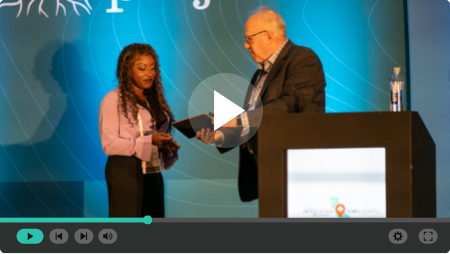

Mariann Yeager has more than 20 years of experience in the health information technology field. She currently serves as CEO for The Sequoia Project, a non-profit solely focused on advancing secure, interoperable nationwide health data sharing in the US. She leads the Recognized Coordinating Entity (RCE) effort, in close collaboration with the Office of the National Coordinator for Health IT to develop, implement, and maintain the Common Agreement component of the Trusted Exchange Framework and Common Agreement (TEFCA) and to operationalize the Qualified Health Information Network (QHIN) designation and monitoring process. The Sequoia Project serves as a steward of independently governed health IT interoperability initiatives, including the RSNA Image Share Validation Program and the Interoperability Matters program, which engages experts from across the healthcare and health IT communities to collaborate to solve discrete challenges to nationwide health information sharing through various workgroups. Ongoing Interoperability Matters workgroups include Information Sharing workgroup, Data Usability workgroup, and the Public Health workgroup. Under her leadership, The Sequoia Project supported, the startup, growth and maturation of two highly successfully interoperability initiatives, the eHealth Exchange and Carequality, which now operate as independent non-profit organizations. Prior to her tenure at The Sequoia Project, she worked with the HHS Office of National Coordinator (ONC) for five years on nationwide health information network initiatives. She also led the launch and operation of the first ambulatory and inpatient EHR certification program in the US.

Dr. Micky Tripathi shared the journey of TEFCA development and implementation, and their vision as the first candidate QHINs move toward designation and go-live.
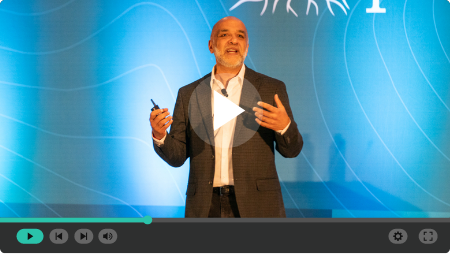
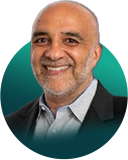
Micky Tripathi is the National Coordinator for Health Information Technology at the U.S. Department of Health and Human Services, where he leads the formulation of the federal health IT strategy and coordinates federal health IT policies, standards, programs, and investments.
Dr. Tripathi has over 20 years of experience across the health IT landscape. He most recently served as Chief Alliance Officer for Arcadia, a health care data and software company focused on population health management and value-based care, the project manager of the Argonaut Project, an industry collaboration to accelerate the adoption of FHIR, and a board member of HL7, the Sequoia Project, the CommonWell Health Alliance, and the CARIN Alliance.
Dr. Tripathi served as the President and Chief Executive Officer of the Massachusetts eHealth Collaborative (MAeHC), a non-profit health IT advisory and clinical data analytics company. He was also the founding President and CEO of the Indiana Health Information Exchange, a statewide HIE partnered with the Regenstrief Institute, an Executive Advisor to investment firm LRVHealth, and a Fellow at the Berkman-Klein Center for Internet and Society at Harvard University.
He holds a PhD in political science from the Massachusetts Institute of Technology, a Master of Public Policy from Harvard University, and an AB in political science from Vassar College. Prior to receiving his PhD, he was a Presidential Management Fellow and a senior operations research analyst in the Office of the Secretary of Defense in Washington, DC, for which he received the Secretary of Defense Meritorious Civilian Service Medal.
Dr. Jennifer Layden, the Director for the new CDC’s Office of Public Health Data, Surveillance, and Technology, shared the unique perspectives and challenges to health information exchange for public health. Following her keynote which highlighted the OPHDSTs public health data strategy, Dr. Layden joined other public health data experts for a fireside chat.


Jennifer Layden, MD, PhD is the Director for the Office of Public Health Data, Surveillance, and Technology. In this position, she is responsible for leading, coordinating, and executing a comprehensive public health data strategy and improving the availability and use of public health data to inform decision-making and action. A primary focus of Dr. Layden’s role is to provide leadership for CDC’s Data Modernization Initiative and serve as an advisor to the CDC Director.
Prior to this position, she served as Deputy Director in CDC’s Office of Science (OS), where she provided strategic leadership in the release of the expanded COVID public use dataset and led strategic efforts to expand and support open data efforts across the agency. She also established and led the strategic science unit within the COVID-19 Response and served as co-lead for the Vaccine Task Force on the response. Dr. Layden is the recipient of numerous honors and awards, including CDC’s Charles C. Shepard Science Award.
Before coming to CDC, Dr. Layden served as the Deputy Commissioner and Chief Medical Officer for the Chicago Department of Public Health and as the State Epidemiologist and Chief Medical Officer for the Illinois Department of Public Health. Dr. Layden played key roles in public health responses to COVID-19, EVALI, Hepatitis A, and synthetic cannabinoid contamination at the state and local level. While at the Chicago Department of Public Health, she helped establish the agency’s first cloud-based data hub to improve electronic health record data reporting and provided strategic vision in developing the agency’s first advanced molecular detection lab through an academic-health department partnership. Additionally, she served on CSTE task forces during both the COVID-19 and EVALI responses, and she has presented at both national and international conferences.
In 2005, Dr. Layden received both her MD and her doctorate in epidemiology from the University of Illinois at Chicago, where she also completed her internal medicine and infectious disease clinical training. She received her undergraduate degree from the University of Notre Dame. Prior to transitioning to public health, Dr. Layden held faculty positions at the University of Illinois at Chicago and Loyola University Chicago. During that time, she conducted numerous studies on Hepatitis C virus disease progression, burden, and treatment response, as well as population-based studies of HCV burden in West Africa. Dr. Layden has authored more than 70 scientific publications.

Debbie Condrey has over 33 years of experience in information technology, mostly in state government. Her career began as a math teacher in the secondary education. She then moved on to an applications analyst position with the Virginia Department of Transportation where she quickly progressed to the Director of IT for the Department. When the Governor of Virginia made the decision to consolidate all information technology services in Virginia under one Agency, Debbie was named the Director of Customer Relationship Management for the Virginia Information Technologies Agency. In 2009, Debbie moved on to the Chief Information Officer Virginia for the Virginia Department of Health, where her goal to make a direct difference for the citizens of Virginia truly came to fruition. Under Debbie’s leadership, key health information tools such as the All Payer Claims Database, the Health Information Exchange (Connect Virginia HIE) and the Emergency Department Care Coordination Program were implemented. The latter project achieved interoperability among the 122 hospitals in Virginia and payers in Virginia; a key step toward delivering health care to the citizens at the right time and in the right setting. In June 2019, Debbie retired from state government and joined The Sequoia Project, Inc as the Chief Information Officer. In this role, she is responsible for managing and overseeing all IT-related projects for Sequoia and works closely with eHealth Exchange and Carequality. Her background and heart for public service fit perfectly with the mission of The Sequoia Project – advancing health information technology interoperability for the public good.

Dr. LeAnne Lovett-Floom has over 30 years in disaster and public health sectors. As a leader in the industry, she is well-respected for her dedication and ethical approach in delivering quality services with numerous local, State, and Federal agencies. Multiple deployments as a disaster healthcare worker and as a first responder have provided insight on care continuums from the lens of the clinician. LeAnne has co-authored numerous scholarly works in best practices and presented at a variety of healthcare conferences. She continues to collaborate with numerous non-profit, academic, and healthcare organizations on quality outcomes in operational planning, disaster response and mitigation. She holds leadership positions within in a variety of pre-hospital, disaster, and public health fields, while also volunteering on numerous boards. LeAnne is delighted to serve as a member of the Interoperability Public Health Workgroup in collaboration with The Sequoia Project to find healthcare information solutions for seamless quality care.

This panel of Candidate QHINs discussed their roll-out plans, prospective participants, and turning their attention to future use cases and FHIR.
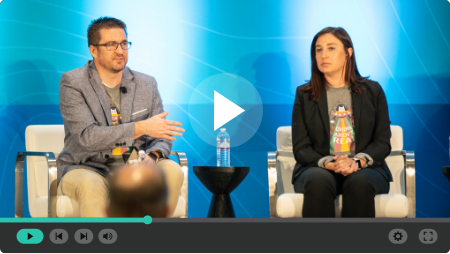

As Executive Director of Carequality, Alan Swenson guides the development and implementation of the Carequality Interoperability Framework, the leading, nationwide trusted exchange framework enabling health data sharing across and among different types of networks and service providers. First implemented in July 2016, the framework now supports the exchange of more than 300M documents a month across more than 4,200 hospitals and 50,000 clinics. Alan also leads Carequality in supporting The Sequoia Project as the Office of the National Coordinator for Health IT’s (ONC’s) Trusted Exchange Framework and Common Agreement (TEFCA) Recognized Coordinating Entity (RCE). Alan has spent more than a decade focused on health IT interoperability. Before leading Carequality, he helped lead an exponential increase in patient record sharing through direct collaboration with hundreds of healthcare systems and provider organizations, EHR vendors, HIEs, HISPs, PHRs, payers, government agencies, and other digital health platforms. He has also volunteered with The Sequoia Project, National Association for the Support of Long-Term Care (NASL), CommonWell Health Alliance, DirectTrust, National Quality Forum, and HIMSS, among other industry interoperability initiatives.

Jay Nakashima leads the eHealth Exchange, the nation’s largest health information network which operates in all 50 states. Incubated by the U.S. Department of Health and Human Services as an ONC initiative, the eHealth Exchange is now an independent non-profit health technology firm dedicated to the public good.
After years in leadership roles at providers, payers, and health IT vendors, Jay now focuses on improving interoperability to improve patient care.

Dave has 25 years of experience in healthcare technology and was instrumental in the launch of Carequality, where he served as Executive Director for six years. Prior to Carequality, he spent 17 years at Epic, where he led implementation and support for the Care Everywhere health information exchange application.

As Director of Product, Liz is responsible for overseeing the execution of the Alliance vision and product roadmap both with the expansion of new use cases and enhancing existing ones.
Previously she was the Product Manager of Interoperability Solutions at Greenway Health, one of the founding members of CommonWell, where she was the P&L owner for all interoperability solutions including Greenway Exchange, CommonWell, Direct Messaging, APIs, and medical device integration.
Liz received her Master of Arts in Communication from Missouri State University and a Bachelor of Science degree in Communication with a focus on Healthcare and Organizational Communication from Ohio University.
Representing the Consumer Voices Workgroup, Shamekka Marty shared her compelling health IT experience as a patient and caregiver. She then joined members of the Consumer Voices and Consumer Engagement Strategy Workgroups to discuss how today’s patient experience can be improved leveraging existing technology and investments.



Brenda Shipley leads strategy, business development, and programs for The Sequoia Project. Her experience spans over 30 years in health care, including Health IT, stakeholder engagement, and strategy building. She has worked in the private sector, academia, and public sector at the state level to expand and grow health data interoperability across the U.S. Prior to joining Sequoia, Brenda was the Chief Operating Officer for a digital health startup and previously served as Connecticut’s interim health information technology officer, coordinating a diverse portfolio of Health IT projects across health and human services agencies. Brenda was instrumental in securing Connecticut’s $45 million State Innovation Model grant funded by the Centers for Medicare and Medicaid Innovation. She built consensus and developed operational plans for healthcare innovation initiatives. Brenda earlier directed projects to launch a health equity research institute at an academic medical center and developed a framework for legislative policy action for the Connecticut’s Office of The Healthcare Advocate, writing policy briefs and legislative testimony to effectuate health policy change. Prior to her public sector and academic work, Brenda led operations, sales, marketing, and business development teams for two successful (IPO and acquisition) healthcare technology start-ups. One start-up was a healthcare data management company that connected enrollment, eligibility, and financial data of large employers and health plans, and the other was a pioneer in the SaaS space, providing a consumer-facing health benefits platform. Brenda began her career at a F100 health insurance company implementing new products, services, and technologies. Brenda earned a bachelor’s degree in business from the University of Connecticut and a master’s degree in health advocacy from Sarah Lawrence College.

Upon recognizing significant unmet needs and challenges in patients' experiences throughout their cancer diagnosis, Dr. Grace Cordovano, BCPA founded Enlightening Results in 2010. As the culmination of her life's experiential learning and education, Dr. Cordovano is dedicated to fostering personalized patient advocacy services, specializing in the oncology space. She strategically guides patients & their carepartners through survivorship or end-of-life care planning with empathy, ensuring they are armed with the most pertinent, medically credible, easy to understand information and tools to make empowered decisions about their care. Dr. Cordovano is a champion for palliative care and clinical trials to be included earlier in cancer treatment planning paradigms. She amplifies the message that treatment planning must focus on treating the whole person, not just a clinical diagnosis. She is an advocate for leveraging digital technologies and data access to enhance treatment of the whole person in the context of life-altering diagnoses as well as for digital health and digital technologies to meet patients where they are.
With over 20 years of advocacy experience, she thoroughly understands the barriers patients face with information blocking and lack of transparency. Dr. Cordovano co-founded Unblock Health to empower patients and their carepartners to hold the ecosystem accountable and fight back against information blocking where patients are in their local communities.
Dr. Cordovano completed her Masters and Ph.D. in Biochemistry at Albert Einstein College of Medicine (Bronx, NY). She is a board-certified patient advocate via the international credentialing of the Patient Advocate Certification Board. She served as one of 5 national e-patient ambassadors for the Coalition of Compassionate Care of California, a PCORI research project funded by the Eugene Washington PCORI Engagement Award. Dr. Cordovano has been repeatedly recognized as Patient Advocate of the Year, most recently at the 2019 Health IT and Marketing & PR Community Conference Medigy Awards. She has been featured in StatNews, KevinMD, Tincture, The Healthcare Blog, US News & World Report, Kaiser News, etc.

Anna McCollister is a health technology entrepreneur, strategic consultant and reform advocate. Her work focuses on creating new ways to involve health care constituents in critical aspects of health research, care and treatment, as well as data governance, evidence development and policy reform.
Anna has founded two health technology startups: VitalCrowd, a Web-based collaboration platform for crowdsourcing the design of health research, and Galileo Analytics, a visual data exploration and analytics company aimed at democratizing access to and understanding of complex health data. Previously, she served as Chief Advocate for Participatory Research at the Scripps Research Translational Institute (SRTI). Through that work, Anna was a Co-Primary Investigator for the “All of Us“ Research Program, a centerpiece of the National Institutes of Health’s Precision Medicine Initiative.
Since 2019, Anna has worked as an independent consultant, advising C-Suite leaders and developing strategic approaches for engaging stakeholders, patients and advocacy groups in critical aspects of corporate and public policy. Anna’s work covers an array of issues and topics, but focuses heavily on data access, use, ethics and governance, with a goal of building corporate programs that enable companies and organizations to earn the trust of patients through action. Anna’s passion for innovation in healthcare is rooted in her personal experiences living with type 1 diabetes. As an entrepreneur and advocate, she was among the founders of the #WeAreNotWaiting movement, a global patient-led hacker movement that helped accelerate the pace of diabetes device data access, connectivity and interoperability.
She speaksfrequently about the promise of digital health, the critical need for patient data access and the imperative and promise of using “real world” data to gain better insight into treatments for complex illness. In 2022, Anna was appointed by the GAO to serve on the federal Health Information Technology Advisory Committee (HITAC), which advises the Office of the National Coordinator for Health IT on federal health IT policy. In addition to her role on HITAC, she serves on a two FDA advisory committees and non-profit advisory boards, helping to facilitate patient centered design of products, policy and research.
This panel of experts discussed the challenges and opportunities of serving patients and caregivers their own clinical data – where, when and how they want it.



Jennifer Blumenthal is a highly accomplished Product Director at Milliman IntelliScript, specializing in developing cutting-edge solutions that facilitate the secure delivery of electronic health records (EHR). Jennifer was previously the CEO and Co-Founder of OneRecord which was acquired by Milliman Intelliscript in 2022.
In addition to her role at Milliman IntelliScript, Jennifer holds esteemed positions in prominent healthcare organizations. She serves as a valued board member of the Sequoia Project, where she contributes her expertise in driving health information exchange initiatives. Furthermore, Jennifer assumes the role of Chair of Consumer-Facing Technology on Carequality's Steering Committee, actively shaping the adoption of consumer-oriented solutions. Her leadership extends to the CommonWell Health Alliance, where she chairs the Privacy & Security Committee, ensuring robust data protection measures.
Jennifer Blumenthal's career exemplifies a deep commitment to leveraging technology to improve healthcare outcomes and empower patients. Through her strategic vision and multidimensional contributions, she continues to advance the realms of health data interoperability, privacy, and security, driving meaningful progress in the healthcare industry.

Glenn Keet has worked in health care information technology and software for thirty five years, and is currently with the Ciitizen division of Invitae where he provides strategy and business development for their HIE initiatives. Glenn was co-founder of Axolotl Corp in 1995, the pioneering commercial HIE platform vendor, which was acquired by Optum in 2010. Before Ciitizen Glenn was U.S. General Manager at Clinithink, a natural language processing software provider serving the life sciences and hospital industries. Prior, Glenn was CEO of ClinCapture, an electronic data capture software company serving the clinical trials industry. Glenn is Vice Chair of the Board of Trustees for Adirondack Health in Saranac Lake, NY on which he has served since 2016. Mr. Keet graduated from Lehigh University in 1986 with a BS in Mechanical Engineering and a BA in Applied Sciences.

This panel of ONC and RCE experts highlighted the changes of Common Agreement v2 and the QHIN Technical Framework (QTF) developed with input from today’s Candidate QHINs.



Lindsey Elkind, Chief Legal Counsel for the Sequoia Project, is an experienced healthcare regulatory attorney with a strong focus in Health IT. She has advised both healthcare providers and non-profits on issues pertaining to policy and compliance with federal healthcare fraud and abuse laws, as well as telehealth, interoperability, information blocking, digital health, privacy, and trust frameworks. She formerly served as Assistant General Counsel for DaVita Inc, supporting its Kidney Care and Integrated Care businesses. Lindsey is focused on supporting nationwide health information exchange, healthcare innovation, and improvements to patient care.

Liz Turi is the Branch Chief for the Care Coordination Branch at the ONC in the Office of Technology, Standards Division. She has an IT career of 26 years, roughly half of that dedicated to Healthcare IT, with roles from software engineering and architecture to implementation to consulting. She has special interests in health equity, SDOH, public health, and interoperability. She is a CPHIMS, and holds a BS in Anthropology from Ball State University, and a MEng in Healthcare Systems Engineering from Lehigh University.

Jason Vogt, Manager and Technical Project Manager at MEDITECH, leads the FHIR API and Structured Documents Interoperability Development Team, championing the vision for APIs and interoperability.
He has served as the Chair of CommonWell’s Standards, Technology, & Implementation Group (STIG), which develops functionality to advance the alliance’s vision of accessible health data, since 2018. He is a member of many CommonWell committees and workgroups, including Data Quality and FHIR. As an active member of FHIR related workgroups and accelerators including Argonaut, FAST and Carequality, Jason focuses on advocating for increased interoperability and use of FHIR standards.
This panel featured a lively discussion of the potential and current reality of FHIR today, and the path being blazed for the future.




Mark Knee is the Deputy Director of the Interoperability Division within the Office of the National Coordinator for Health Information Technology’s (ONC) Office of Policy, where he works on federal health IT and interoperability policy. Prior to coming to ONC, Mark worked in different capacities within the federal government assisting federal agencies—including the Department of Justice, Environmental Protection Agency, and Office of Personnel Management—in policymaking and enforcement activities. Mark earned his J.D. from William & Mary Law School and was a Presidential Management Fellow.

David has been working with Healthcare IT in the EMEA, U.S.A. and other regions providing technical design, strategic advice and training for organizations and governments for over 15 years. David is a subject matter expert in HIEs and health IT standards including FHIR, privacy and security. David is a trainer on FHIR and FHIR implementation guide creation, the technical architect of the TEFCA QHIN Technical Framework, Facilitated FHIR IG and SOPs and author of public and private FHIR Implementation Guides. He is a co-chair and member of technical workgroups for healthcare IT standards development organizations including IHE and HL7. As an active member of HL7 International, David is a member of the Technical Steering Committee, a Project Lead on the FHIR Consent Resource project and co-chair of the Community-Based Care and Privacy Workgroup.

Jeff Taylor, a dedicated Enterprise Business Architect at Surescripts, is passionate about driving interoperability through industry standards for all network stakeholders. As the lead orchestrator of the corporate FHIR strategy at Surescripts, Jeff's vision is to transform healthcare data exchange. With two decades of rich experience in the healthcare sector, Jeff has ventured across diverse domains, from developing software for FDA-approved medical devices to orchestrating requirements and design for Electronic Health Record (EHR) systems. Beyond his professional endeavors, Jeff finds joy in coaching his daughter's 6th-grade volleyball team and relishes the opportunity to hit the golf course whenever a moment of free time presents itself.

This panel shared in a discussion of how authentication mechanisms need to balance the need for security with the operational reality of providing care to patients.


Johnathan Coleman currently serves as the Chief Information Security Officer (CISO) for the TEFCA Recognized Coordinating Entity (RCE) and provides SME support to the Office of the National Coordinator (ONC) for Health IT and the Defense Health Agency (DHA). He previously worked as Coordinator for the ONC Standards and Interoperability (S&I) Framework and led several projects including the Data Segmentation for Privacy (DS4P) and Social Determinants of Health (SDOH) Data Tagging projects. Johnathan has a BEng in Aeromechanical Systems Engineering from the Royal Military College of Science in UK, maintains professional security certifications including CISSP, CISM and CRISC, and co-chairs the Community Based Care and Privacy workgroup at Health Level 7 (HL7) International.


Drew is the Chief Information Security Officer for Epic Nexus, the candidate QHIN designed to support the Epic Community’s ability to participate in the expanded interoperability offered by TEFCA. Drew has worked at Epic for more than 17 years, where he has spent his career helping healthcare organizations rapidly adopt innovative technologies like cloud computing, machine learning, and more recently, generative AI. He brings his extensive experience developing and implementing secure and scalable platforms to Epic Nexus’s plans to rapidly onboard Epic-using organizations to TEFCA.

Elliott Jones serves as the Chief Information Security Officer and Vice President for Kaiser Permanente. In this capacity he leads Kaiser's national cybersecurity vision in key areas, including cyber strategy, resiliency, defense, and incident response. With over 20 years in cybersecurity, including 7 years in healthcare, Elliott has specialized in leading large organizations by developing security strategy, establishing and enforcing governance, overseeing cybersecurity operations, and coordinating security adoption during acquisitions. Prior to joining Kaiser Permanente, Mr. Jones has served as the CISO for both Keck Medicine of USC in Los Angeles and Rady Children’s Hospital in San Diego. He has also supported the US Navy, Space and Naval Warfare Systems Center Pacific’s enterprise cybersecurity program. Mr. Jones holds a Master’s degree in Computer Science from the University of California, Irvine and a Bachelor of Science degree in Mathematics from Pepperdine University.
During this session policy and government affairs experts reflected on health care and health IT legislative and regulatory activity in 2023 and explored what to expect in 2024. Get the latest scoop on Capitol Hill and Administration activities related to interoperability and information sharing, privacy and security, telehealth, and more.


Lindsey Elkind, Chief Legal Counsel for the Sequoia Project, is an experienced healthcare regulatory attorney with a strong focus in Health IT. She has advised both healthcare providers and non-profits on issues pertaining to policy and compliance with federal healthcare fraud and abuse laws, as well as telehealth, interoperability, information blocking, digital health, privacy, and trust frameworks. She formerly served as Assistant General Counsel for DaVita Inc, supporting its Kidney Care and Integrated Care businesses. Lindsey is focused on supporting nationwide health information exchange, healthcare innovation, and improvements to patient care.

Chantal Worzala is Principal at Alazro Consulting. An experienced policy expert, she helps technology companies, associations, provider organizations, and patient advocates to understand and navigate the digital health policy landscape. She has a broad range of expertise in federal health programs, digital health innovation and adoption, interoperability, privacy, and administrative simplification, Medicare payment policy, health care quality, and new models of care. Chantal previously served as vice president of health information policy at the American Hospital Association, where she was recognized as a leading voice on digital health policy. Chantal also served as Senior Analyst for the Medicare Payment Advisory Commission. She holds a Ph.D. from the Johns Hopkins School of Public Health and an MPA from the Woodrow Wilson School at Princeton University.

Zoe Barber has a decade of experience working to advance health IT adoption, health information exchange, and interoperability. She currently serves as Policy Director for the Sequoia Project where she leads the organization’s government affairs and industry relations strategy on the Trusted Exchange Framework and Common Agreement (TEFCA), information blocking, and other legislative and regulatory activities impacting the health IT landscape. Previously, she served as Senior Manager of Federal Policy at the New York eHealth Collaborative (NYeC), NY’s State Designated Entity charged with the governance, coordination, and administration of the Statewide Health Information Network for New York (SHIN-NY). Zoe also worked as a Senior Policy Advisor at the HHS Office of the National Coordinator for Health Information Technology (ONC) on nationwide health information network initiatives. She holds a Master’s Degree in Public Health from the George Washington University and a Bachelor’s Degree in Political Science from Lehigh University.

Lindsay Austin is a Principal in the Washington, D.C. office of Troutman Pepper Strategies. Lindsay has nearly 15 years of congressional and legislative experience coupled with her work as a Washington government relations representative to corporations, industry associations, non-profits, and universities. Lindsay works with clients across numerous sectors, with an emphasis on health care, health information technology, public health, food safety, agriculture, education, and a variety of other policy areas. Combining her political and policy know-how with her Washington and Georgia network, Lindsay excels at developing and executing strategy for clients at the federal level.
Carequality Executive Director Alan Swenson opened the second day of the meeting, and shared current news regarding the organization.
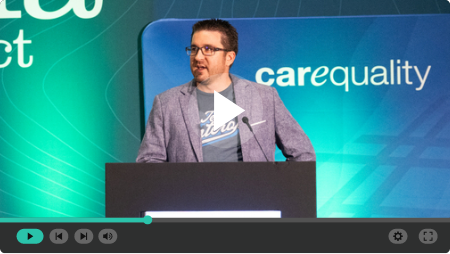

As Executive Director of Carequality, Alan Swenson guides the development and implementation of the Carequality Interoperability Framework, the leading, nationwide trusted exchange framework enabling health data sharing across and among different types of networks and service providers. First implemented in July 2016, the framework now supports the exchange of more than 300M documents a month across more than 4,200 hospitals and 50,000 clinics. Alan also leads Carequality in supporting The Sequoia Project as the Office of the National Coordinator for Health IT’s (ONC’s) Trusted Exchange Framework and Common Agreement (TEFCA) Recognized Coordinating Entity (RCE). Alan has spent more than a decade focused on health IT interoperability. Before leading Carequality, he helped lead an exponential increase in patient record sharing through direct collaboration with hundreds of healthcare systems and provider organizations, EHR vendors, HIEs, HISPs, PHRs, payers, government agencies, and other digital health platforms. He has also volunteered with The Sequoia Project, National Association for the Support of Long-Term Care (NASL), CommonWell Health Alliance, DirectTrust, National Quality Forum, and HIMSS, among other industry interoperability initiatives.
During this session Candidate QHINs talked about their internal decision making, and why other types of organizations may choose to be participants and subparticipants in this new government endorsed paradigm for exchange.


Zoe Barber has a decade of experience working to advance health IT adoption, health information exchange, and interoperability. She currently serves as Policy Director for the Sequoia Project where she leads the organization’s government affairs and industry relations strategy on the Trusted Exchange Framework and Common Agreement (TEFCA), information blocking, and other legislative and regulatory activities impacting the health IT landscape. Previously, she served as Senior Manager of Federal Policy at the New York eHealth Collaborative (NYeC), NY’s State Designated Entity charged with the governance, coordination, and administration of the Statewide Health Information Network for New York (SHIN-NY). Zoe also worked as a Senior Policy Advisor at the HHS Office of the National Coordinator for Health Information Technology (ONC) on nationwide health information network initiatives. She holds a Master’s Degree in Public Health from the George Washington University and a Bachelor’s Degree in Political Science from Lehigh University.

Laura McCrary, Ed.D. is a seasoned healthcare executive with 25 years of experience in the industry. With a commitment to improving healthcare outcomes through innovative solutions, Dr. McCrary has successfully led KONZA National Network through tremendous change and growth over the years.
Dr. McCrary is widely recognized in the industry for her achievements in establishing a successful and financially sustainable Health Information Exchange. She is the founding Executive Director/CEO of the Kansas Health Information Network, now known as KONZA. During her tenure, KONZA has expanded into 11 states and now provides a vast array of analytic and health information exchange solutions to providers, patients and health plans.
Dr. McCrary is passionate about health information technology that improves health outcomes and reduces provider and patient burden. To this end, Dr. McCrary is leading KONZA in the development of new products that focus on improving health access, evaluating healthcare quality and transforming health data into formats necessary to support value-based payment models, medical research and clinical trials.
Dr. McCrary attended Kansas State University where she earned a bachelor’s degree in education with a focus on history and political science, two master's degrees in learning disabilities and severe emotional disturbance and a doctorate in education administration. She completed post-doctoral work in administration from the University of Kansas. In addition, Dr. McCrary has served as an adjunct professor at Kansas State University and Rockhurst University-Helzberg School of Management, teaching courses in health information technology and quality.

Matt has worked as a healthcare developer for over 15 years, with the last decade focused on interoperability. He is the development lead for Care Everywhere, working with the healthcare community to identify and prioritize projects of strategic value to patients, providers, payers, and more. His team has helped healthcare providers successfully implement a variety of standards-based, interoperable workflows, including real-time chart exchange, electronic closed-loop referrals, disability benefits determination, and international exchange.

John Blair, III, MD, F.A.C.S., CEO of MedAllies, is a health care and technology executive with broad experience across the health care industry. MedAllies securely delivers vital health information to impact care by operating multiple nationwide interoperable networks supporting all healthcare constituents. MedAllies focuses on optimizing the adoption and usage of healthcare interoperability for the people, systems and services connected to our MedAllies networks, eliminating information care gaps and fostering a truly interoperable and connected future. We serve more than 700 hospitals, 100,000 providers and dozens of vendor partners bringing together millions for a more fluid healthcare experience. MedAllies operates a Direct Trust accredited Certificate Authority, Registration Authority, and Health Information Service Provider running on the 2015 edition ONC certified MedAllies Direct Solution software. MedAllies is a Carequality Implementor supporting treatment and Individua Access Services. MedAllies is HITRUST CSF certified and is aligning with QHIN requirements with the intention to apply during the first application round.

After publishing the first-of-its-kind data usability implementation guide, the Data Usability Workgroup is raising the bar for health IT interoperability content, ensuring clinical data is useful to people and machines in development of implementation guide version 2, which expands to new categories such as laboratories, how systems receive data, and payer data exchange.


Mrs. Davis has >25 years’ experience in the healthcare industry with emphasis on conformance testing, implementation, development, and management of information technology solutions and healthcare workflow requirements. She serves as the VP, Informatics, Conformance and Interoperability for the Sequoia Project that is a 501©3 not for profit organization based in Washington, DC. Her expertise includes connecting people, processes and technology to improve health care. She is responsible for the operations of 8 testing programs for Sequoia, including the RCE onboarding testing for TEFCA. She leads a group of experts from a wide range of stakeholders across the US to develop specific and pragmatic implementation guidance on improving data quality of the clinical content exchanged among networks and communities in the Data Usability workgroup under the Sequoia Interoperability Matters Forum. She also acts as the subject matter expert supporting the deployment efforts of the Image Exchange Use Case Implementation Guide for Carequality.

William (Bill) Gregg, MD, MS, MPH, joined HCA Healthcare in 2014 and serves as Vice President of Interoperability. In addition to his medical degree, Dr. Gregg holds an undergraduate degree in Electrical Engineering from the Georgia Institute of Technology. He earned master’s degrees in Clinical Informatics and Public Health at Vanderbilt University and was a VA Quality Scholars Fellow. He is board certified in Internal Medicine and Clinical Informatics. At a national level, he is Co-Chair of the Sequoia Project’s Data Usability Workgroup whose charge is to identify practical solutions to make interoperability work better for clinicians and patients. Dr. Gregg also serves on the Sequoia Project Interoperability Matters Leadership Council and the SMART Health IT Advisory Committee. Prior to joining HCA, Dr. Gregg served as an Assistant Professor of Informatics and Medicine at Vanderbilt University and was the Director of Population Health Informatics. He helped develop successful clinical programs and led software development in population health and clinical decision support. His primary focus is on system level integration of technology, interoperability, and processes to support transformation of clinical care in our rapidly changing healthcare landscape.
Deputy Secretary of the Department of Health and Human Services (HHS) Andrea Palm is the Chief Operating Officer and is responsible for overseeing the day-to-day operations of the Department. Andrea was the afternoon’s keynote speaker
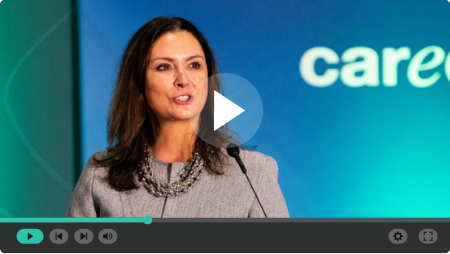

Andrea Palm is the Deputy Secretary of the Department of Health and Human Services (HHS). As Deputy Secretary, she is the Chief Operating Officer and is responsible for overseeing the day-to-day operations of the Department.
Palm most recently served as Secretary-designee of the Department of Health Services (DHS), overseeing one of the largest state agencies in Wisconsin as a member of Governor Tony Evers' cabinet. In this role, she had responsibility for the state's Medicaid program, its Supplemental Nutrition Assistance Program (SNAP), and behavioral health programs, among others. DHS is also Wisconsin's public health agency, and as such, Palm led the state's response to the COVID-19 pandemic.
Previously, Palm held a number of policy and operational roles in the Obama-Biden Administration at HHS, including Acting Assistant Secretary for Legislation, Counselor, Chief of Staff and Senior Counselor to the Secretary. During her eight-year tenure, she worked on a variety of Administration priorities, including the Affordable Care Act, as well as providing leadership for the Department's work to combat the opioid epidemic.
Palm was born and raised in rural, upstate New York. She holds a Bachelor's degree from Cornell University and a Master's degree from Washington University in St. Louis.
Our panel of experts discussed how the infrastructure of today’s health information exchange can support the payer community and others.



Justin McMartin is the Manager of the Clinical History and Direct Product team at Surescripts. He focuses on expanding the impact of our clinical history solutions, Care Event Notifications, Record Locator & Exchange and Clinical Direct Messaging.
Justin has 15 years of experience in health information technology and has served in roles leading product development, marketing, implementation and support of interoperability solutions. He also plays an active role in the trust framework community by participating in various DirectTrust and Carequality workgroups and committees. For fun, Justin is in his second year of law school at Mitchell Hamline School of Law and enjoys raising his small herd of Shorthorn cattle in rural Minnesota with his family.

Matt is the Vice President of Interoperability at Kno2, where his focus is on improving interoperability across the entire continuum of care. He is responsible for overseeing specific projects aimed to extend interoperability into hard-to-reach markets, and groups not previously part of government incentive programs to drive interoperability, such as LTPAC, behavioral health, EMS and more. Matt actively volunteers and contributes to standards development and rulemaking. He is an elected member of the Carequality Steering Committee. He also participates with CommonWell, DirectTrust™, HIMSS, NASL, PAICO Project, The Sequoia Project, and 360X Referral Management Protocol among other industry interoperability initiatives.

With over two decades in health IT, Paul L Wilder has held various roles focusing on imaging, clinical informatics and interoperability. As the Executive Director of CommonWell Health Alliance, he runs the not-for-profit trade association devoted to the simple vision that health data should be available to individuals and caregivers regardless of where care occurs. CommonWell members have deployed CommonWell services across its network in all 50 states, Puerto Rico and Washington, D.C. More than 25k provider sites are utilizing these services daily.

Brian Malachowski is the Director of Core Interoperability Services at CVS Health. He focuses on developing Clinical & Interoperability Data Products across the CVS Health enterprise including Pharmacy, Aetna, Caremark, Specialty, and other lines of business. Brian has over 15 years of experience in health information technology with roles in product development, marketing, change management and driving interoperability solutions. He is an active contributor to the clinical data exchange community participating in multiple workgroups supporting Carequality and TEFCA. He is an advocate for broad adoption of clinical data exchange and interoperability standards across the full continuum of care.
Hear how a newly-forming payer community of practice is thinking about advancing implementation readiness for data exchange among and between payers.


David has been working with Healthcare IT in the EMEA, U.S.A. and other regions providing technical design, strategic advice and training for organizations and governments for over 15 years. David is a subject matter expert in HIEs and health IT standards including FHIR, privacy and security. David is a trainer on FHIR and FHIR implementation guide creation, the technical architect of the TEFCA QHIN Technical Framework, Facilitated FHIR IG and SOPs and author of public and private FHIR Implementation Guides. He is a co-chair and member of technical workgroups for healthcare IT standards development organizations including IHE and HL7. As an active member of HL7 International, David is a member of the Technical Steering Committee, a Project Lead on the FHIR Consent Resource project and co-chair of the Community-Based Care and Privacy Workgroup.

Desla Mancilla, DHA, RHIA, is the Manager of Health Data Interoperability at Blue Cross Blue Shield Association (BCBSA). In this capacity, she contributes to interoperability efforts by leading the Association's education efforts on standards-based clinical data exchange. In addition, she serves as a primary liaison for a number of private-public partnerships with whom BCBSA is involved in advancing its interoperability principles. Immediately prior to joining BCBSA in May, 2019, Dr. Mancilla was the Vice President of Academic Affairs at the American Health Information Management Association (AHIMA) where she led academic strategy for the nearly 400 academic colleges and universities across the nation delivering associate, baccalaureate, and graduate degrees in health information management. She also has held numerous academic appointments in University settings, including Health Informatics and Information Management program director. In previous foundational roles, Dr. Mancilla served as the Regional Director of Information Protection Services for a large healthcare system, HIM Department Director, and IT staff development manager.

Interoperability Leader at Humana Inc. for the past 10 years driving payer interoperability and standards for payer-provider capabilities for Humana and the industry. She has been participating in the interop, standards arena for over 20, years participating with HL7 and other industry organizations. Mrs. Beavin is a current member of the Carequality Steering Committee and the Sequoia Board of Directors. She is the Co-chair of Epic’s Payer Governance Council and on the DaVinci Coordinating Committee and CARIN Alliance. Mrs. Beavin participated in the USCDI task force for ONC and is a past member of the Kentucky HIMSS board.

Hear from members of a community of practice committed to moving data implementation guidance from paper to production over the next 18 months.


Mariann Yeager has more than 20 years of experience in the health information technology field. She currently serves as CEO for The Sequoia Project, a non-profit solely focused on advancing secure, interoperable nationwide health data sharing in the US. She leads the Recognized Coordinating Entity (RCE) effort, in close collaboration with the Office of the National Coordinator for Health IT to develop, implement, and maintain the Common Agreement component of the Trusted Exchange Framework and Common Agreement (TEFCA) and to operationalize the Qualified Health Information Network (QHIN) designation and monitoring process. The Sequoia Project serves as a steward of independently governed health IT interoperability initiatives, including the RSNA Image Share Validation Program and the Interoperability Matters program, which engages experts from across the healthcare and health IT communities to collaborate to solve discrete challenges to nationwide health information sharing through various workgroups. Ongoing Interoperability Matters workgroups include Information Sharing workgroup, Data Usability workgroup, and the Public Health workgroup. Under her leadership, The Sequoia Project supported, the startup, growth and maturation of two highly successfully interoperability initiatives, the eHealth Exchange and Carequality, which now operate as independent non-profit organizations. Prior to her tenure at The Sequoia Project, she worked with the HHS Office of National Coordinator (ONC) for five years on nationwide health information network initiatives. She also led the launch and operation of the first ambulatory and inpatient EHR certification program in the US.

Lauren currently serves as AHIMA’s Chief Public Policy and Impact Officer. In this capacity, she is responsible for providing strategic and operational oversight over AHIMA’s advocacy and programmatic strategy to demonstrate mission impact. Prior to that, Lauren served as Vice President of Policy & Government Affairs at AHIMA, overseeing the organization’s policy and advocacy before Congress and various federal agencies. With two decades of healthcare policy experience, Lauren previously worked on Capitol Hill where she was actively involved in almost every aspect of a congressional office, including serving as Chief of Staff—a position that requires the ability to quickly synthesize multiple issues and adapt to constantly shifting priorities. Lauren received her JD from American University Washington College of Law and a Bachelor of Arts from Vanderbilt University. She is admitted to practice law in New York.

For over 10 years, Dr. Miller has been the Chief Medical Officer of MedAllies, a company that leverages HIT and clinical practice transformation to improve healthcare value. MedAllies operates one of the leading Health Information Service Provider (HISP) networks in support of interoperability. At MedAllies, Dr. Miller provides operational, tactical, and strategic collaborative leadership.
Dr. Miller is currently a Co‐Chair or member of many Health Information Technology (HIT) Interoperability related committees and workgroups engaged in enhancing healthcare value. These include committees within the following organizations: Sequoia: CareQuality and DaVinci; CMS: DRLS, PACIO, EMDI, 360X; DirectTrust; Integrating the Healthcare Enterprise (IHE); NCQA; HIMSS; and KLAS. She continues to be a frequent speaker at national conferences.
Dr. Miller was formerly a VP and the CMIO of University Hospitals and Health Systems (UH), a community‐based system with more than 150 locations, seven wholly‐owned and four affiliated hospitals throughout Northern Ohio. Prior to joining UH, she worked as an HIT Managing Director for the Cleveland Clinic where she also maintained a clinical practice in General Internal Medicine. She has been active in healthcare informatics research and has been a co‐investigator on multiple grants.

Duncan Weatherston has been an IT professional and entrepreneur for over 25 years. He has a multidisciplinary background that spans business development, systems integration and support. As Smile Digital Health's CEO, Duncan works closely with healthcare organizations to strategically tackle persistent data collection and sharing challenges.
Learn about the approach this new cross-industry workgroup has taken to identify steps to further propel the healthcare community forward around two primary issues: computable consent and data segmentation for privacy.
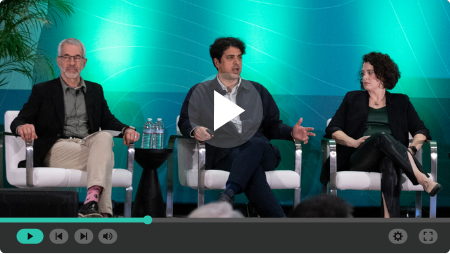

Chantal Worzala is Principal at Alazro Consulting. An experienced policy expert, she helps technology companies, associations, provider organizations, and patient advocates to understand and navigate the digital health policy landscape. She has a broad range of expertise in federal health programs, digital health innovation and adoption, interoperability, privacy, and administrative simplification, Medicare payment policy, health care quality, and new models of care. Chantal previously served as vice president of health information policy at the American Hospital Association, where she was recognized as a leading voice on digital health policy. Chantal also served as Senior Analyst for the Medicare Payment Advisory Commission. She holds a Ph.D. from the Johns Hopkins School of Public Health and an MPA from the Woodrow Wilson School at Princeton University.

Mohammad Jafari, PhD., an independent subject-matter expert in security, privacy, interoperability, and consent and an adjunct Faculty at the College of Health Solutions at Arizona State University and. He is a decade-long member of the HL7 Security work group, and is a co-chair of Community-Based Care and Privacy (CBCP) and the Human and Social Services (HSS) workgroups. He is the co-author and technical facilitator of the FHIR Data Segmentation for Privacy (DS4P) Implementation Guide and has also served as the Principal Investigator and Project Director of the ONC LEAP project on Advanced Scalable FHIR Consent APIs. Most recently, he co-lead the Consent at Scale initiative within the HL7 FHIR at Scale Taskforce (FAST).

Health Gorilla's Chief Medical Officer Steven Lane, MD, MPH, has worked in Clinical Informatics for over 25 years, most recently as the Clinical Informatics Director of Privacy, Information Security, and Interoperability at Sutter Health, and has been a primary care physician for more than 35 years. Dr. Lane is chairman of the Carequality Steering Committee and a member of The Sequoia Project board of directors. He is also on the Health Information Technology Advisory Committee (HITAC), the HIMSS Interoperability & HIE Committee, and the Da Vinci Project Clinical Advisory Council.

Nichole Sweeney, J.D., is General Counsel and Chief Privacy Officer for CRISP, the state-designated regional HIE for Maryland. In this role she advises the CEO, Senior Leadership, and the Board of Directors on all legal priorities pertaining to the organization including privacy, HIPAA and data use matters, strategic initiatives and their implementation, negotiation and management of partner agreements, and core operational issues and optimization. Additionally, Nichole leverages her rich experience in public policy to strategically inform advocacy efforts for interoperability matters at the local, regional, and national level.
For more than a decade prior to joining CRISP, Nichole has held progressive leadership roles at MITRE, a non-profit operator of federally funded research and development centers (FFRDCs) that assist the U.S. government with scientific research and analysis, development and acquisition, and systems engineering and integration. Throughout her tenure, she has had the unique opportunity to work hand-in-hand with agencies across the Department of Health and Human Services (HHS) umbrella to strategically plan and develop their regulatory implementation of major healthcare legislation. Nichole partnered with the Office of the National Coordinator for Health Information Technology (ONC) and the Centers for Medicare & Medicaid Services (CMS) in drafting and implementing their healthcare information technology (IT) interoperability regulations.
The Sequoia Project is working with Canada Health Infoway as they advance a pan-Canadian trusted exchange framework. Hear about the Shared Pan-Canadian Interoperability Roadmap, and discover the challenges and opportunities for advancing interoperability in Canada.
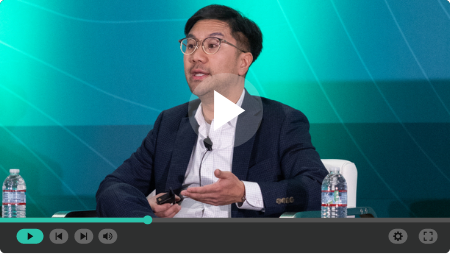

Alan Lau leads the Strategy & Delivery Office for Canada Health Infoway’s Digital Health Interoperability (DHI) Program. Alan was one of the lead authors of the Shared pan-Canadian Interoperability Roadmap and now oversees its execution to drive national, jurisdictional and health system value.
Prior to Infoway, Alan spent a number of years in management consulting where he was a trusted advisor to many health system c-level executives on corporate strategy and IT strategy and operational excellence. Previously, Alan also spent a number of years leading large scale transformation projects in the acute care sector.
Our nation faces a primary care shortage while patients are diagnosed with chronic conditions more than ever before. Pharmacists are trained to provide patient services as part of integrated care teams; however, payment reforms and broader interoperability are needed to help this valuable resource fill the care gap. Listen in as panelists shared their perspectives on novel and needed approaches to evolve care teams for the future.



Lisa is knowledgeable on pharmacy practice issues including pharmacy operations, pharmacy quality measurement, DSCSA, pharmacy automation, and health IT. She utilizes her unique skills to support pharmacy owners nationwide on a variety of practice transformation and business issues.

Kevin Nicholson, R.Ph., J.D., is Vice President, Public Policy, Regulatory & Legal Affairs
for the National Association of Chain Drug Stores (NACDS). In this role, he is responsible for the strategic direction of the Association’s public policy and regulatory affairs activities. Nicholson oversees activities and staff in providing legislative and regulatory policy analysis in federal and state healthcare issues. He and his team provide expertise to lobbyists and other Association staff, as well as chain members. He has over 30 years experience in the pharmacy industry, including six years as a practicing community pharmacist.

Pooja is the Pharmacy and PBM Practice Lead for Point-of-Care Partners, a management consulting firm assisting healthcare organizations in the development technology strategies. Pooja is a seasoned strategy executive focused on projects at the intersection of healthIT strategy, policy and standards. Throughout her career, Pooja’s efforts have been instrumental in bringing more relevant and critical information to providers and patients electronically, which results in improved patient outcomes.
Pooja is the former Chair of the National Council for Prescription Drug Programs (NCPDP) Board of Trustees where during her term, she helped lead the organization through a 3- year strategic planning exercise which resulted in the organization’s new strategic efforts focused on pharmacy interoperability, care coordination and innovation.
Pooja is also a member of the Office of National Coordinator (ONC) Health Information Technology Advisory Committee (HITAC) Pharmacy Interoperability and Emerging Therapeutics Task Force which is responsible for making recommendations related to pharmacy interoperability to the HITAC Committee. She also sat on the HITAC Interoperability Standards Workgroup which is tasked with making recommendations for new data class and elements for US Core Data for Interoperability (USCDI).
Executive Director Alan Swenson highlighted Carequality’s role as the leading the industry-led trusted exchange framework, and the innovations to be expected in 2024.
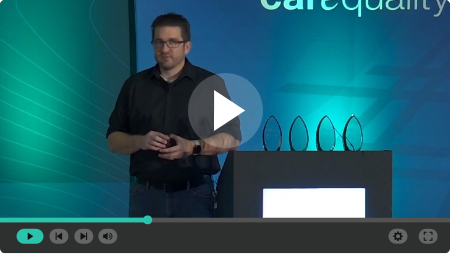

As Executive Director of Carequality, Alan Swenson guides the development and implementation of the Carequality Interoperability Framework, the leading, nationwide trusted exchange framework enabling health data sharing across and among different types of networks and service providers. First implemented in July 2016, the framework now supports the exchange of more than 300M documents a month across more than 4,200 hospitals and 50,000 clinics. Alan also leads Carequality in supporting The Sequoia Project as the Office of the National Coordinator for Health IT’s (ONC’s) Trusted Exchange Framework and Common Agreement (TEFCA) Recognized Coordinating Entity (RCE). Alan has spent more than a decade focused on health IT interoperability. Before leading Carequality, he helped lead an exponential increase in patient record sharing through direct collaboration with hundreds of healthcare systems and provider organizations, EHR vendors, HIEs, HISPs, PHRs, payers, government agencies, and other digital health platforms. He has also volunteered with The Sequoia Project, National Association for the Support of Long-Term Care (NASL), CommonWell Health Alliance, DirectTrust, National Quality Forum, and HIMSS, among other industry interoperability initiatives.
Relieve the fear of missing out (FOMO) on the unconference sessions you couldn’t attend. Facilitators of each Unconference Session joined a panel discussion to share insights and highlights of their group discussions earlier in the day.
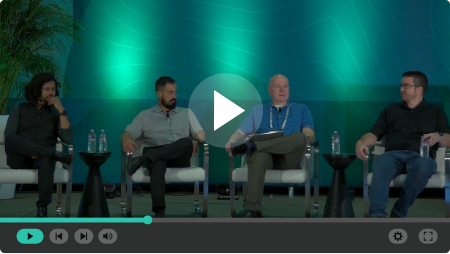




Copyright © 2025 The Sequoia Project. All rights reserved.